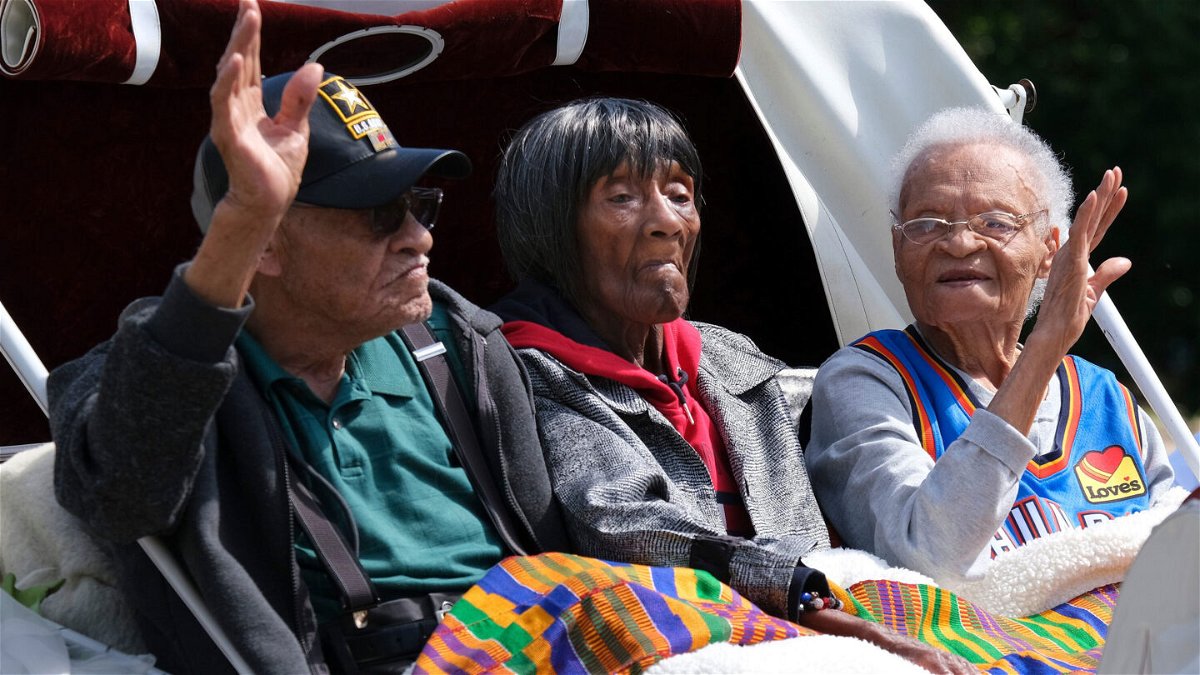Tulsa judge allows 1921 race massacre lawsuit to move forward

A Tulsa judge is allowing a lawsuit brought by plaintiffs that include three living survivors of the 1921 Tulsa Race Massacre to officially move forward. The three survivors
By Omar Jimenez and Brandon Tensley, CNN
A Tulsa judge is allowing a lawsuit brought by plaintiffs including three living survivors of the 1921 Tulsa Race Massacre to officially move forward.
The written order, filed on Wednesday, provides the reasoning behind a May decision by Tulsa County District Judge Caroline Wall that denied in part and granted in part a motion to dismiss the case brought forward by defendants, including the city of Tulsa and Tulsa County. No further details were offered at the time.
The three living survivors are Viola Fletcher, Lessie Benningfield Randle and Hughes Van Ellis Sr.
They’re all more than 100 years old, and were children when a White mob, over the course of approximately 24 hours on May 31 and June 1, 1921, destroyed the prosperous Greenwood District of Tulsa, Oklahoma, that was beloved as Black Wall Street.
Some 300 people were killed, while thousands more were left homeless, according to the Tulsa Historical Society and Museum.
In May, Ed Mitzen, the co-founder of the New York-based nonprofit Business for Good, presented a $1 million donation to Fletcher, Randle and Van Ellis as a way to start reckoning with the wrongs they’ve had to endure.
Members of the survivors’ legal team celebrated the order as a means toward justice.
“This order is something we’ve been waiting on since our historic hearing back on May 2, 2022,” Damario Solomon-Simmons, attorney for the survivors, said during a news conference on Thursday. “This order gives us the framework for how we get to move forward.”
“Although we didn’t get everything we wanted,” Solomon-Simmons continued, “these three survivors have the ability to move forward with our case. For the first time in over 100 years, we have an opportunity to prove that the massacre created a public nuisance here in Tulsa, and that public nuisance needs to be abated. This is a historic win for our community. This is a historic win for our survivors. And it’s a historic win for racial justice advocates throughout this country.”
Michael Swartz, another attorney for the survivors, echoed some of Solomon-Simmons’ sentiments.
“This is a landmark ruling,” Swartz said Thursday. “It allows us not only to file the papers in court but to take the next step that nobody’s achieved before, with taking discovery — taking documents, taking depositions — and getting to the root of what actually happened in the massacre.”
What the court said
The plaintiffs brought claims for public nuisance and unjust enrichment.
Regarding the public nuisance claim, the court allowed the claim brought by the three survivors to proceed but dismissed the claim from the other plaintiffs. The court found that the survivors established standing to sue, noting that “a private person may maintain an action for a public nuisance if it is especially injurious to himself, but not otherwise.”
“The court finds Plaintiffs Randle, Fletcher and Van Ellis Sr. meet this statutory criteria,” Wall wrote.
Wall cites a separate case when writing, “A pleading must not be dismissed for failure to state a legally cognizable claim unless the allegations indicate beyond any doubt that the litigant can prove no set of facts which would entitle him to relief.”
She then adds, “The court cannot find beyond any doubt that Plaintiffs Randle, Fletcher, and Van Ellis Sr. can prove no set of facts which would entitle Plaintiffs to relief on their public nuisance claims.”
The plaintiffs had argued that the damage inflicted during the massacre was a “public nuisance” from the start and “one of the worst acts of domestic terrorism in United States history since slavery.”
Generally, a public nuisance is when a person or entity “unreasonably interferes with a right that the general public shares in common,” according to the Legal Information Institute.
“We look forward to proving our case around the Massacre’s ongoing catastrophic effects and demonstrating the actions that defendants must take to repair and rebuild the Greenwood community during our clients’ lifetimes,” said Solomon-Simmons as part of a released statement.
While part of the claim for a public nuisance was allowed to proceed, claims for an “ongoing” public nuisance were “dismissed with prejudice because these claims request relief that violates the separation of powers provided by the Constitution of the State of Oklahoma.”
“Therefore, the court dismisses with prejudice the public nuisance claims described in Plaintiff’s Amended Petition seeking relief for all alleged unreasonable, unwarranted, and unlawful acts or omissions of defendants in the decades subsequent to the 1921 Race Massacre, including but not limited to policing, urban planning, and public schools,” Wall wrote.
Part of the rejected plaintiffs’ argument was that the damage in 1921 led to ongoing damages and disparities that still play out today in Tulsa.
But Wall cited a recent historic Oklahoma Supreme Court Johnson & Johnson public nuisance decision that said in part, “The Court has allowed public nuisance claims to address discrete, localized problems, not policy problems.”
The court dismissed the claim for unjust enrichment but is giving the three remaining plaintiffs an opportunity to file an amended petition. The court also granted leave for the plaintiffs to amend their petition to attempt to replead an abatement remedy.
While testifying before members of a House Judiciary subcommittee in May 2021, Randle, one of the survivors, snapped into focus the profound devastation of the massacre.
“They owe us something. They owe me something. I have lived much of my life poor. My opportunities were taken from me and my community. North Tulsa, Black Tulsa, is still messed up today. They didn’t rebuild it. It’s empty. It’s a ghetto,” she said.
The plaintiffs have until September 2 to file an amended petition.
The-CNN-Wire
™ & © 2022 Cable News Network, Inc., a WarnerMedia Company. All rights reserved.